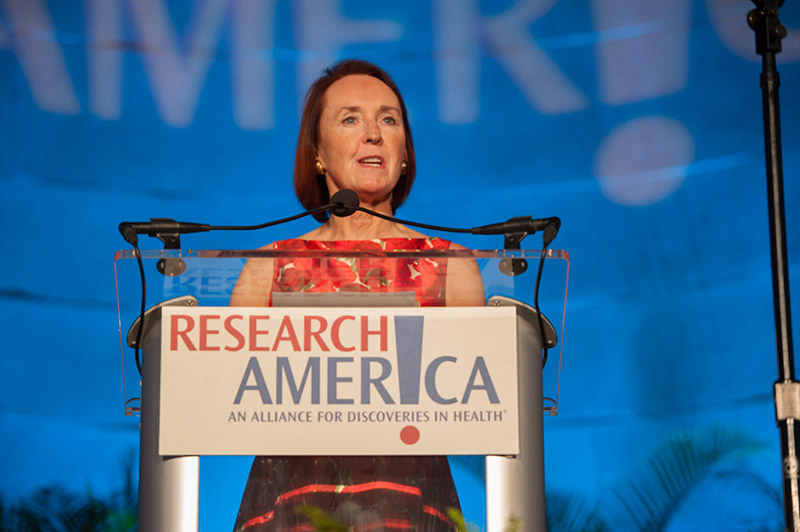10 Minutes to Impact

Dear Research Advocate,
Members of Congress are back in their home states for August recess, with most focused on the midterm elections. Their Congressional staff members, meanwhile, continue to work on legislative priorities.
This same dual focus is the right one for outreach. R&D advocates can seed faster medical and public health progress by 1) engaging in candidate outreach; and 2) making the case with current members of Congress and their respective staff members for action on time-sensitive legislative priorities. Here are four ways – three of them quick and one of them quick-ish – to make a difference:
Nonpartisan Candidate outreach in ten minutes or less: If candidates champion medical progress as they seek votes, they are more likely to do the same if elected/re-elected! Take a moment to send this fact sheet to candidates via social media or drop a hard copy by their local offices – these days, that’s innovative!
Not sure how to connect? Check out these quick tips for contacting your candidates. It takes less than 10 minutes (we’ve tested it!) Let us know of any feedback you receive.
Congressional outreach in ten minutes or less:
- SBIR/STTR – Reauthorization or Expiration: Unless reauthorized in September, the Small Business Innovation Research (SBIR)/Small Business Technology Transfer (STTR) program will expire, chilling innovation. Check out this overview of the program’s positive impact and use this editable email urging your members of Congress to champion SBIR/STTR reauthorization!
- FDA User Fees: a progress-multiplier at risk: User fees enable the FDA to apply more resources to the review of new medical treatments and technologies. This reduces the time it takes to determine whether these potential advances meet the mark for safety and effectiveness, and in so doing, increases the number of patients who benefit from approved advances.
Despite the consequences of inaction, the user fee programs will end unless reauthorized by 9/30/22. Congress has yet to pass final user fee legislation. Tweet congressional leadership urging them to get the job done.
Media outreach in – let’s face it – a bit more than 10 minutes (Take a stab at it anyway!):
- Pandemic Preparedness – We don’t have the luxury of time: Yet another piece of stalled legislation is the PREVENT Pandemics Act (S. 3799). Further, there has been no congressional action to fund the NIH’s Pandemic Preparedness plan, which would fast track the R&D needed to prevent the next pandemic from wreaking even more havoc than COVID-19. Congressional inaction in the face of COVID, monkeypox, polio, and now the Langya virus seems impossible, yet here we are. Exercise your skills of persuasion and employ these tips and talking points to craft a letter to the editor or a social media post making the case for pandemic preparedness now. Virtually any article on an infectious threat can be the launchpad.
The LGBTQ+ Patient Experience: According to a report published in Medscape on August 9, “About one-third of physicians see disparities in LGBTQ+ medical care due to patients’ sexual orientation or gender identity.” Among the many reasons to eliminate disparities like this is that the value of research depends on its reach. Excluding any patient from its benefits is a tragic waste of progress.
We will be addressing critical facets of health equity, including workforce and clinical trials diversity, during our 2022 National Health Research Forum. When it comes to diversity, where are we on the path from need to norm? How can advocates help remove obstacles impeding that path? Join us to help answer those questions and be part of other solution-oriented discussions!
Help Spread the word!: The application cycle closes soon – September 9 – for Research!America’s 2022-2023 Civic Engagement Microgrants. Early career scientist-led groups from across the United States will receive funding to support innovative public engagement activities. We hope you will help us reach as many early career researchers as possible by sharing this opportunity with your networks on Twitter, LinkedIn, and Facebook.
Speaking of Inspiring Early Career Scientists: I encourage you to read a compelling new blog post by former Research!America Science Communications Intern Laurie Zabala. She shares her experience helping form a graduate student science policy organization, The Vannevar Group, at Georgetown University. Of special interest is how this from-scratch group built on the recommendations of Vannevar Bush’s “Next Frontier” report, with today’s challenges and capabilities in mind.
A Can’t Miss Alliance Discussion! Join us next week on Tuesday, August 23, at 2:30 p.m. ET for a discussion with Garrett Devenney, Health Policy Advisor for the Senate Health, Education, Labor and Pensions (HELP) Committee Majority. Garrett will discuss R&D-related legislative priorities for the committee, under its Chair, Senator Patty Murray (D-WA). Within the HELP Committee’s broad jurisdiction, it has oversight responsibility for NIH, ARPA-H, CDC, FDA, and AHRQ.
Stay well, stay safe, stay cool, and stay connected.




